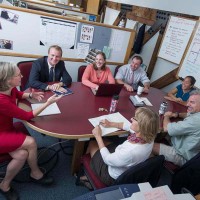Today was the last day of school of the 2013-14 year. The students were enjoying their first day of sleeping in for the summer, but the faculty was tasked with one final School Improvement Day. Long days of meetings can be a challenge even for the most focused educator and when you hold said meeting on the last day before summer break, well we’ll just say students can be more focused. Despite where our heads were today, there was still important work to be done.
Next year our school will be beginning an important conversation on assessment and how we measure mastery. Today was to start that conversation and plant seeds of innovation in hopes that ideas would sprout over the break. However meeting fatigue set in and conversations may not have been as fruitful as our leaders had hoped.
Recently a former professor and friend of mine, @EdselClark, blogged about Turning Meeting Fatigue into Team Learning. For those of you in leadership roles, whether formally or informally, I encourage you to read his thoughts. Often the outcome of a meeting is placed in the hands of those in charge. And while they may set the agenda we share an equal responsibility in setting the tone and end result of our gatherings.
Knowing that meetings will take place whether we are focused or not, how can we maximize what we get out them? Here are my suggestions for being a contributor, not a contaminator at school meetings.
- Come Prepared. Typically ahead of the meeting an agenda will be published. It may not contain every point that will be made but it will give you an overview of what to expect. Don’t wander into the meeting space wondering what will be discussed. When you enter a meeting unaware and unprepared you severely limit what you can add to the conversation and are forced to fumble thinking of questions.
- Stay engaged. Depending on the date, time and subject of the meeting you may find your mind wandering or your cellphone calling your name. Resist the temptation. Somewhere along the line your leader thought this material was relevant and important enough to be shared. Chances are you will see the topic again. The more engaged you are in the meeting, the less there will to be surprised about later.
- Be open to the conversation. The world of education is changing around us. Meetings often take place to discuss these changes and how they will affect our schools. When we decline to participate because we disagree with what is being presented we are robbing ourselves of our voice. Worse, we are robbing our students of our voice. We entered the realm of education to be advocates for our students. If you are a competent teacher you should be confident sharing your opinion, pro or con, because you believe what you are doing is in the best interest of students.
- Surround yourself with who you want to be. I encourage my students to make wise choices when it comes to their peers and who they sit by in class. We know that sitting by the right students can bring a child up, and sitting by the wrong students can bring unwanted distractions. The same holds true for us as professionals. If you want to get the most out of a faculty meeting you must sit by others who want to get the most out of a meeting. Sitting in the back can lead to the lure of tuning out, socializing or making lunch plans. Sitting with the right crowd can energize you and start a flow of fresh ideas.
- Provide feedback. Sadly not all presenters leave time for discussion or questions at the end of a meeting. That doesn’t mean we should leave a meeting without expressing ourselves. If time is not left at the end for feedback, spend time at the end of the reflecting on the content of the meetings and find a time to share with your leader the next day or week. This can be a great time to share your support for their ideas or offer a suggestion on how to increase engagement amongst the staff.
It may be the job of administrators to lead meeting and take final responsibility over our schools, but that doesn’t mean we should abdicate the voice we have been given as professional educators. We all have valuable insights and ideas that deserve to be heard beyond the four walls of our classrooms. I charge you to take ownership over your school and the future of education starting by taking an active role in your next building or team meeting.


Comments are closed.